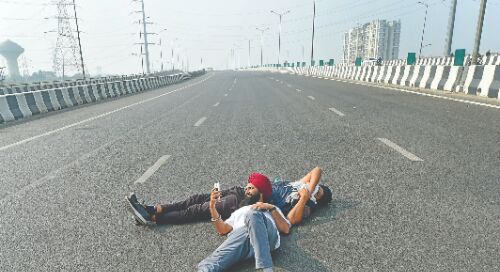On weekdays, a cop faces a farmer, on Sundays, a son meets his father

New Delhi: 65-year-old Rohtas Singh, who grows wheat and vegetables in a small plot of land in Outer Delhi's Narela area, has now been living at the Delhi-Haryana (Singhu) border for 10 days, protesting with his family and fellow farmers against the three new farm laws enacted by the Centre.
Every day, Singh's 32-year-old son takes a shower, gets dressed and shows up at the protest site — on the other side of the barricade, in his Delhi Police uniform, with riot gear and the mental preparation that if something goes topsy-turvy, he might just have to raise his lathi and strike farmers, not unlike his father and other relatives.
"I have farmers' blood running through my veins. At heart, I will always support their cause even though my work will not allow me to," the 32-year-old cop told Millennium Post on Sunday while he was visiting his father on his day off.
The policeman, who wished to remain anonymous, given the nature of his work at the Capital's border right now, has been posted near the Singhu border since last week. The father-son duo quickly put aside whatever they were doing sat down for a chat. They talked over tea and identified with the cause.
"I know deep down that they are right but my job won't allow me to protest with them. I am posted at the Singhu Border and I see my father protesting here. Today is my off day so I came to see if he needed anything that I could get for him to help him as a son in these tough times," he said on account of anonymity.
While Rohtas manages to grow his produce in Narela and sell it in the Capital, he said his extended family lives in Punjab and Haryana and that they too had joined the protests against the farm laws. He said he was protesting in solidarity with his farmer-relatives and all other farmers who will be adversely affected due to the
laws.
"In Haryana, the MSP of Bajra is Rs 2,000 and when farmers go to sell it they get Rs 1,200 for the produce. In their own party-led state, this is the situation. How can they assure us that these laws will not be the final nail in our coffins," Singh asked.
The deep trust deficit that has developed between the nation's food growers and its government has been amplified as talks between both sides resumed since December 1. While the Centre seems willing to make amendments to the laws in question, the farmers insist they want them to be repealed.
While Singh said he is able to sell his produce in Delhi at full MSP, his family in neighbouring states face trouble getting their dues. "I am here to support them," he added.
And even as the trust deficit grows between the Centre and the farmers, the violence meted out to them when they had first started their "Delhi Chalo" march has added to their doubts about whether the current government is truly acting in the farmers'
welfare.
In fact, while many medical camps were set up at Delhi's borders soon after the violence on November 27, injured farmers continue to reach border points to join the protests from different states — injured by law enforcement authorities in the states they pass through.
More than 200 injured farmers who had walked and reached the protest site in a bid to support their counterparts were treated at one such medical camp and are now recuperating after availing first aid services.
Director of United Sikhs Organisation — an NGO which works in collaboration with United Nations — Pritam Singh said that they had treated more than 2,500 farmers who were injured during lathi charge, use of water cannon and tear gas but refused to leave the protest site.
"Around 20 of them needed stitches and had to be convinced to get treated. Most farmers are ferocious in spirit who do not care much about medical aid. Several are walking around with their injuries refusing to leave the protest site and take rest," he said. The NGO has deployed a cardiologist, a surgeon and an MD at the protest site.
Meanwhile, one of the youngest farmer leaders, Satnam Singh Sahni and part of Bharatiya Kisan Union (Doaba) said that an internal meeting of farmer unions of various states was held on Sunday to review the protest strategy, which may change in the coming days.



